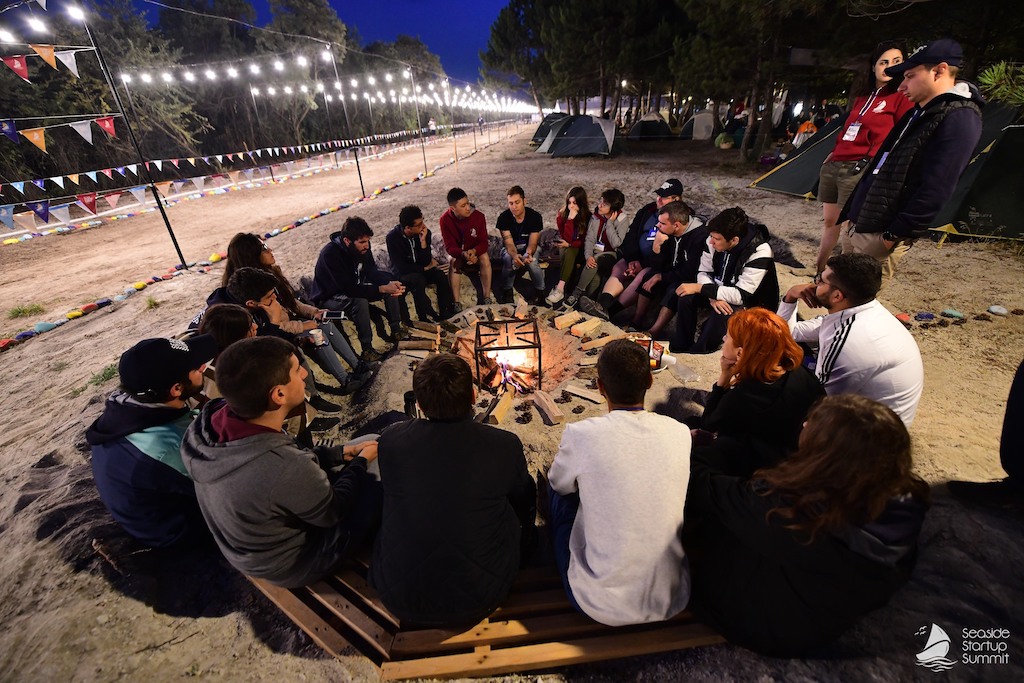How we came up with our company culture
Diario del capitán, fecha estelar d385.y38/AB

Having a very distinct and unique company culture sets us apart from other development consultancies.
Investing big time in creating and nurturing it is paying off manyfold for us. It has helped us to hire better, to get more clients and to become a respected company in our industry.
Yesterday night, I gave a talk about company culture in the Seaside Startup Summit, by a campfire on the shore of Lake Sevan, in Armenia. It's been a pretty unique experience which allowed me to connect with my audience deeper than in other surroundings.
I talked for well over an hour to cover four pillars of company culture and how it's played out for us after over five years of running MarsBased. I covered how we created our company culture as a new company, then how this allowed us to hire better, and, in turn, how are we managing our team leading by example. Lastly, I'm going to talk about how to nurture company culture in remote teams.
To make it more digestible for the reader, I have broken down a huge blog post into four, so each one will cover one part of my talk.
Let's get this started!
Let's face it: development consultancies are not sexy businesses.
There are thousands of similar companies in the four corners of the world, and the vast majority do the same kind of stuff, offering the same technologies and very similar services. You pay all these companies in exchange for a service: some charge for their time, some for value delivered, but all of them have got teams of consultants, developers or similar roles which create and/or manage IT projects. Some specialise in certain sectors while others are generic, and then there also geographic and other more specific criteria to categorise them.
But there are LOADS of them.
How to stand out in such a jungle of competitors? We do it through our company culture.
At first, we didn't think of company culture as something that could help us to differentiate, as Spain does not really have a tradition of strong company cultures. Hence, we got the inspiration from abroad.
One of the reasons why we created a remote working company is because we read the books by the Basecamp founders: Rework and Remote: No Office Required before starting the company.
By reading these books, it dawned on us that we could run a very small and lean agency, and that's how we built MarsBased on top of the foundations they provide. We built an all-remote workplace, focused on delivering high-end technological products, following the simpler is better principles and driven by transparency and high specialisation.
We don't think we are especially great at creating new company cultures. We are (really) good at developing, which is our core business. So we decided to go the practical way and started with a very lean and simple company culture that would help us to get started, largely inspired by a lot of principles described in the aforementioned books.
Actually, following our simpler is better principle, why overcomplicating things?
By adopting principles of other companies we liked and mixing them with our own, we found our own identity, which has eventually consolidated into a strong lifestyle and values that have been accompanying us for over five years, now.
Be aware, though, that this worked for us but it might not work for everybody else.
One good way to know if somebody else's company culture can help you to define your company's is to ask yourself these questions: "would I work for that company?" or even better "would I work for any company which shared these values?". If the answer is yes, then you're headed in the right direction.
Defining the values of a company and, in turn, the company culture isn't trivial. For decades, lots of companies adopted big, magnanimous words such as excellence, truth, respect and the like, without really describing what do they mean and how they should be implemented in their employees' daily life.
Company culture should give you an answer as to how to act in your daily life at work and how to react to the unexpected situations and problems you might face. Therefore, choosing big words is useless if you don't define a certain set of guidelines as well.
We have heard a gazillion times how big consultancies sell reports for big sums of money to their clients, and when they can reuse a report for somebody else, they just change the logo, replace the company names and sell them again for even bigger money. If such consultancies have got transparency and honesty in their values, they're just not living up to them.
If you're really aligned with your values, you will find yourself embodying them more often than not.
There I said it.
Let's focus on what we do and how we do it.
In this section, I'd like to share a few examples of situations we've encountered in our company on many different fronts. For the sake of simplicity, I will just talk about one of our values: simpler is better.
If the emails we send to people were excessively prosaic and entangled, we wouldn't be living up to our values. Our emails are short, direct and purposeful.
If we need to communicate two different things to a client over email, and both require a good deal of words, we'd rather send two separate emails to avoid mixing stuff.
I have worked for other firms that would send dozens of documents to potential clients, along with their proposal. Off the top of my head: a list of services offered by the company, a manual of all the certifications the company had, a description of the technologies that would be used, a compilation of some of their best employees and a portfolio of similar projects and their outcomes.
Following our value of simplicity, we have grouped all of this into just one document.
We know people don't have time to read documents and they want to go straight to the meaningful parts, so our quote document has got one or two slides per section, a pretty clear explanation of the prize and two or three similar projects we've done.
Negotiations and legalese are hard, long and exhausting.
By default, we use the client's NDA and contracts. It's simpler for them, and we don't mind that much. It reduces the back and forth of documents and different versions thereof, which sometimes can mean getting the deal before other companies.
When we have to work with our documents, we use one really simple template of NDA and a contract that includes just a few clauses with very clear language.
If our website had a hundred different sections, each with thousands and thousands of keywords and filler text to appear bigger than what we are, we wouldn't be following our principle.
We try to go for the simplest solution by default, because we're always on time to add more stuff if needed.
Conversely, it's almost always too late to subtract parts you didn't need from the beginning.
We will always favour a simple and easy-to-read solution over an intricate one, but the solution must always be good in the long term and err on the side of quality.
A simple solution that just solves the situation momentarily is a short-sighted decision and will make our life more complicated later on.
Thinking long term helps us to simplify our future lives.
We travel often. Sometimes to visit clients, sometimes to conferences or to our company get-togethers.
During the latter, for instance, we're twelve people flying out from a few different airports, so in order to simplify the management, expenses and logistics, we will try to group people in the same flights and taking the same taxis. Not only will you cut on expenses (one taxi with four people is better than four taxis with one person each), but you will also reduce the risk of someone missing the flight.
When we started organising our monthly Startup Grind events in Barcelona, we had three short keynotes (😱!!!) before the main fireside chat. That made the event too long and too hard to coordinate. If it's difficult to get a speaker, try getting four!
In our fourth event, we cut down to just one keynote before the event, and a few months after, we would only give the keynote to one sponsor.
In our fourth year, we decided that the event would just have the fireside chat, and we haven't lost people nor sponsors. We're bigger than ever, with a simpler and more relaxed format!
As the company grows, so do its chores. Processes we once could manage in a few minutes per week have grown out of measure and take a significant percentage of our day.
For instance, accounting. In the first year, we barely had expenses (a few meals, a taxi and that's it) and we only had one or two clients at a time, and thus we invoiced seldom.
Now, we're twelve plus a bunch of freelancers and have about a dozen of concurrent clients. To reduce the amount of time we spend managing all of this, we have automated certain processes using software and we've outsourced others to an external agency who helps us to manage this.
We try to avoid meetings as much as possible. There are certain situations where it makes sense (a critical deploy, an on-site brainstorming session with a client, a conflict with an employee, etc.), but for most clients we only take one meeting per week, where we tell them what we've done the week prior, what's the state of the project, and what we will do next.
Internally, our meetings have got no fixed agenda. If we need to talk about something, that's the agenda of the meeting, but we don't go through a fixed list of items that need to be revised every time. For that, we've got asynchronous communication over Basecamp.
Hope you found these examples useful! I could go on for hours! There are hundreds of situations where we have applied our values and company culture to make our lives easier and to devise a solution aligned with our principles. You will see more in our next blog posts.
As I mentioned earlier in the post, following our simpler is better value, I've broken down a very long blog post in four parts, so stay tuned for the next one!

As remote teams become more and more prevalent how can you build community among your distributed workforce?
Leer el artículo
Having a strong company culture sets the expectations for future hires and lets them know in advance how's your day-to-day like in your company. In this post, we explain how our company culture has helped us to hire faster and better.
Leer el artículo
One key aspect of company culture is how it is transmitted from the founders, or the C-levels and high ranks, to the rest of the company. In this blog, we will share how we do it at MarsBased!
Leer el artículo